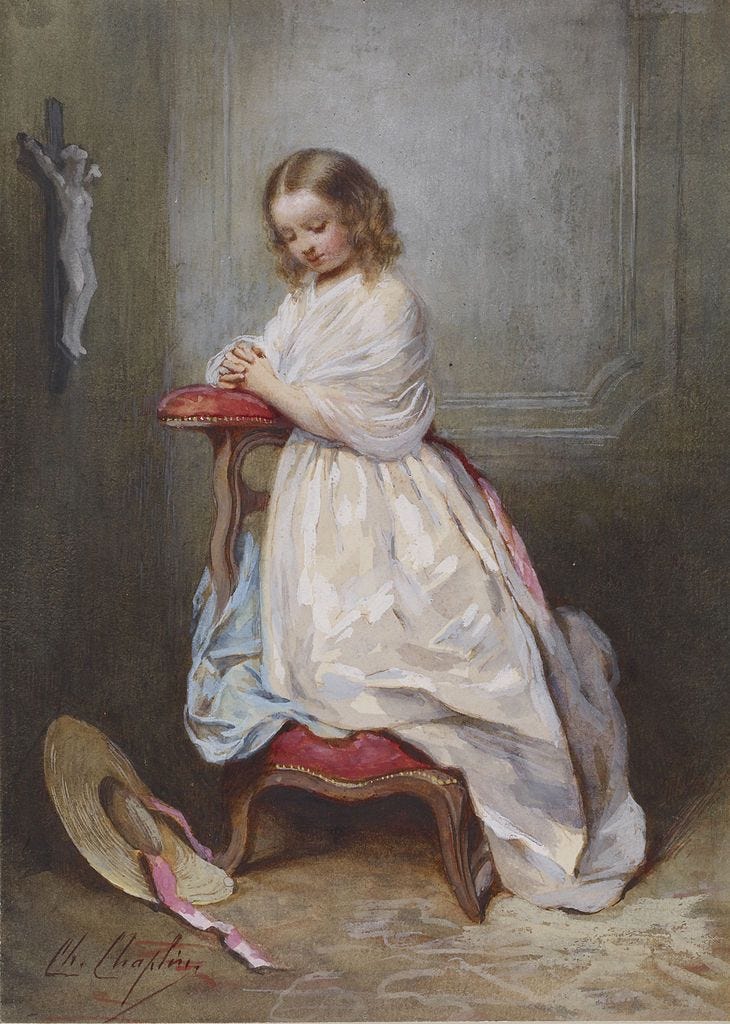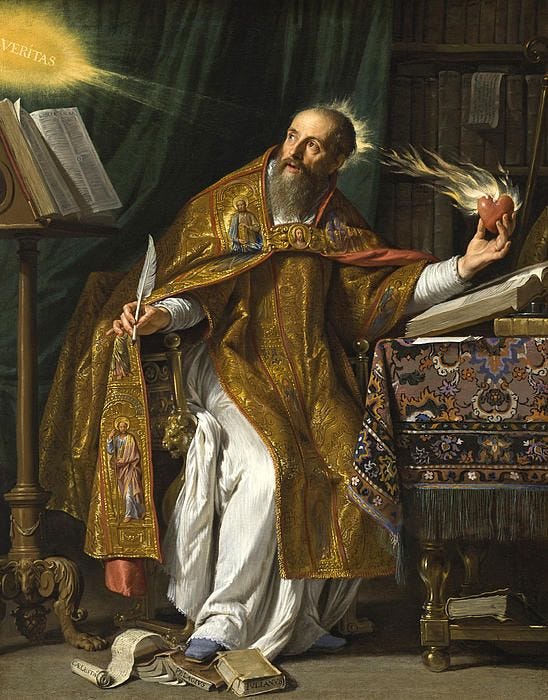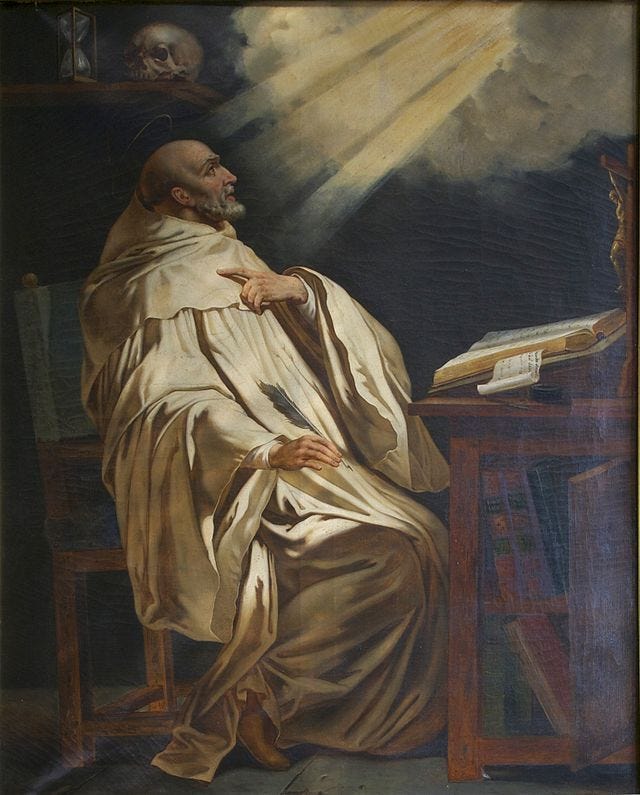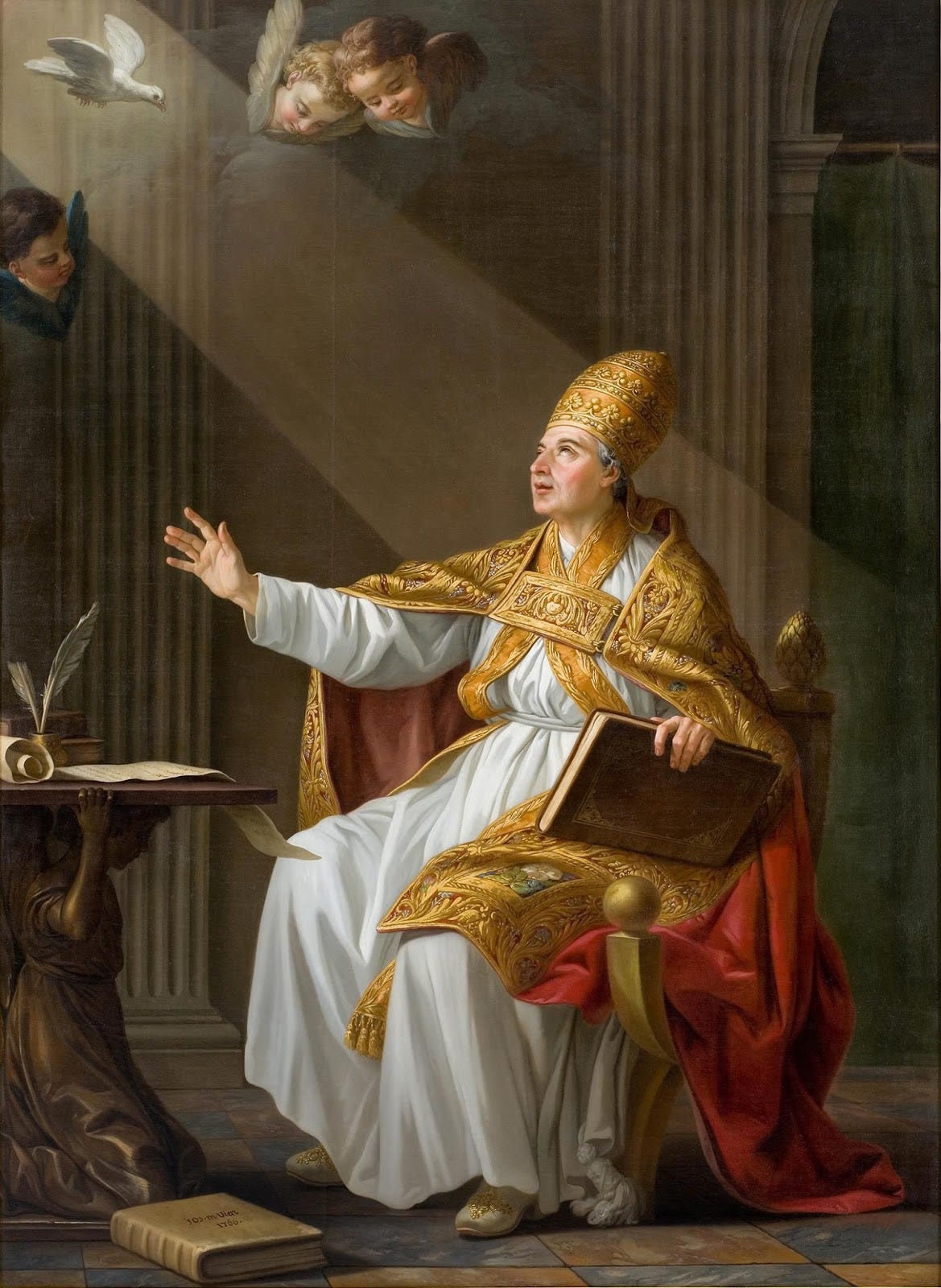Of the seven gifts of the Holy Spirit, there are four intellectual gifts which enlighten the mind: knowledge, understanding, wisdom, counsel. The other four gifts strengthen the will.
If we examine the gifts in relation to the virtues they perfect, then knowledge, understanding, and wisdom perfect the three theological virtues, faith, hope, and charity.
The Gift of Knowledge:
Definition:
The gift of knowledge perfects the virtue of faith and gives us knowledge of created things in their relation to God.
The gift of knowledge makes us form sound judgments of creatures in their relation to God. This knowledge is not philosophical knowledge acquired through reasoning; nor theological knowledge acquired by applying reason to the data furnished by faith; but it is the science of the Saints, where we rightly judge of creatures in their relation to God.
Object:
The object of the gift of knowledge is created things, inasmuch as they lead us to God.
If we consider the origins of creatures, they come from the hands of God, their Creator and Preserver. If we consider their nature, we see a likeness or reflection of God.Their end and purpose is to bring us to God. They are steps by which we rise to Him.
Usefulness:
The gift of knowledge detaches us from creatures by showing us how empty and fleeting they are, how incapable of making us happy, and even how dangerous they are, since they tend to pervert us by alluring us, enslaving us, and turning us away from God. Being detached from all these, we can more easily rise unto God Who alone can satisfy the longings of our heart.
The gift of knowledge helps us make right use of creatures by prompting us to use them as means by which we rise to Almighty God. We instinctively long to enjoy creatures and we are tempted to make them our end; but under the influence of this gift, we no longer see in them anything except what God has placed in them. From this imperfect reflection of the Divine Beauty, our mind turns to Infinite Beauty.
Cultivating the Gift of Knowledge
The greatest means is to look upon creatures with the eyes of faith.
Instead of lingering in the contemplation of fleeting shadows, we must rather look beyond to the First Cause Who deigns to impress upon them a likeness of His perfections, and must cling to their Author.
Animated by this spirit, we shall know how to deprive ourselves of whatever is useless, and even of some things that are useful. We shall know how to forego at times looking at beautiful objects, reading some interesting book, enjoying some delicious food, and the like, in order to make a sacrifice to God.
In this manner, we shall gradually detach ourselves from creatures, and see in them only that which can lead us to their Maker.
The Gift of Understanding
The gift of understanding differs from the gift of knowledge in that its object is more extensive. Its scope is not limited to created things, but extends to all the revealed truths.
This gift does not give us an understanding of mysteries, but it enables us to see that, despite their obscurity, they are credible and in accord with reason.
Definition:
The gift of understanding is a gift which, under the enlightening action of the Holy Ghost, gives a deep insight into revealed truths, but without giving a comprehension of the mysteries themselves.
St. Thomas says the gift of understanding enables us to penetrate into the core of revealed truths in six ways:
It discloses to us the substance hidden beneath the accidents, for example, Jesus Christ under the Eucharistic species.
It explains to us the meaning hidden beneath the words, such as what Our Lord did in disclosing the meaning of the prophecies to the disciples on the way to Emmaus.
It makes manifest the mysterious signification of sensible signs, such as in Baptism by immersion is the symbol of our death to sin, our spiritual battle, and our resurrection with Christ.
By it, we see the spiritual realities contained beneath the outward appearances, showing us the Creator of the world in the artisan of Nazareth.
By it, we see the effects contained in their cause; for example, in the Blood of Christ shed on Calvary we see the purification of our soul and our reconciliation with God; in the pierced side of Jesus we see the birth of the Church and the source of the Sacraments.
By it, we see the cause in its effects, such as the action of Providence in external events.
Thus, the gift of understanding shows us the truths of faith under so full a light, that though we do not comprehend their very nature, we are confirmed in our belief.
“We know that whatever be the outward appearances, they do not contradict the truth ... we ought not depart from matters of faith.”- St. Thomas Aquinas
This gift brings us to the knowledge of a greater number of truths, by aiding us to draw theological conclusions from the revealed principles contained in them. For example, from the words “And the Word was made flesh and dwelt amongst us,” nearly all our teaching concerning the Incarnate Word is deduced.
This gift is extremely advantageous to all the faithful, but especially useful to priests and theologians, that they may gain an understanding of the revealed truths they are to explain to others.
Cultivating Knowledge:
Cultivate Humility to Understand Truths:
The main disposition required to obtain this gift is a lively and simple faith which humbly implores divine light, the better to lay hold of revealed truth. "Give me understanding; and I will learn Thy law; and I will keep it with my whole heart.” - Psalm 118:34 (DR) The maxim of St. Anselm was: “Faith seeking reason.” He would make a lively act of faith before searching into the mysteries of our faith, for it is through faith that we come to an understanding of supernatural truths.Study and Compare these Truths:
Once this act of faith has been made, we should accustom ourselves to go to the very heart of the mystery, not in order to comprehend it, which is impossible, but in order to grasp its meaning, its bearing, its relation to reason. After studying a number of mysteries, we should compare them, one with the other, for such a comparison will often throw much light upon each one of them.Love These Truths:
The better to grasp these truths, we must love them. We must study them even more with the heart than with the mind, and above all with a humble spirit. Our Lord Himself tells us this in the following beautiful prayer to His Father: “I confess to Thee, O Father, Lord of heaven and earth, because Thou hast hid these things from the wise and prudent and hast revealed them to little ones.”
The Gift of Wisdom
The gift of wisdom perfects the virtue of charity. It resides in the intellect and in the will, since it infuses light and love into the soul.
It is rightly considered as the most perfect of all the gifts because it embodies all the others, just as charity embodies all the virtues.
St. Bernard calls the gift of wisdom: “the knowledge which relishes things divine.”
The gift of wisdom is twofold:
a light which illumines the mind and enables it to judge rightly of God and of created things, by relating them to their first principle and last end. It enables us to estimate things according to their highest causes and to gather them, into one grand synthesis.
a supernatural taste which acts upon the will and enables it to relish divine things as by a sort of natural attraction.
A comparison of the twofold role of wisdom:
It is like the sunbeam: a ray of light illuminating and delighting the eyes of the soul, and a ray of heat that warms the heart, inflames it with love, and fills it with joy.
Wisdom may be defined as:
a gift which perfects the virtue of charity by enabling us to discern God and divine things in their ultimate principles, and by giving us a relish for them.
Wisdom differs from understanding:
Understanding → enables us know divine truths in themselves and their relations, but not in their ultimate causes, and does not make us relish them directly.
Wisdom → makes us love and relish them.
Understanding is a view taken by the mind, while wisdom is an experience undergone by the heart. Understanding is light, wisdom is love, and so they unite and complete one another.
Wisdom remains the more perfect gift, for the heart exceeds the intellect; it sounds greater depths, and grasps what reason fails to reach.
This is particularly the case with the Saints, in whom love often surpasses knowledge.
Effects of the Gift of Wisdom.
Besides the increase of charity produced in the soul, this gift perfects all the other virtues.
It renders faith unshakable because of the quasi-experimental knowledge it gives us of the truths of revelation;
It steadies our hope;
It enables us to practise the moral virtues in their highest degree, for when we have tasted the joys of divine love, those of earth hold no relish for us; we love the Cross, mortification, effort, temperance, humility, meekness, because these are means of becoming more like the Beloved and of returning His love.
Cultivating the Gift of Wisdom
Since wisdom is one of the most precious gifts, we must long for it ardently, beg for it insistently, and pursue it with untiring efforts.
→ Wisdom refers all to God, so we should try to see how all the truths we study proceed from Him as their first principle and tend towards Him as their last end.
→ We must acquire the habit of referring all things to their principles, without losing ourselves in the details; of reducing all things to unity, by making a particular synthesis of what we have studied, thus preparing the general synthesis of all our knowledge.
Wisdom makes us relish divine things, so we must seek to love and enjoy these. We must recall that all knowledge that does not lead to love is vain.
“Taste and see that the Lord is sweet.”
How can we help but love God, Who is Infinite Beauty and Infinite Goodness?
How can we help loving divine things, in which we see a participation in God’s beauty and God’s goodness?
We cannot love and enjoy God, and not also love those things which share in His perfections.













